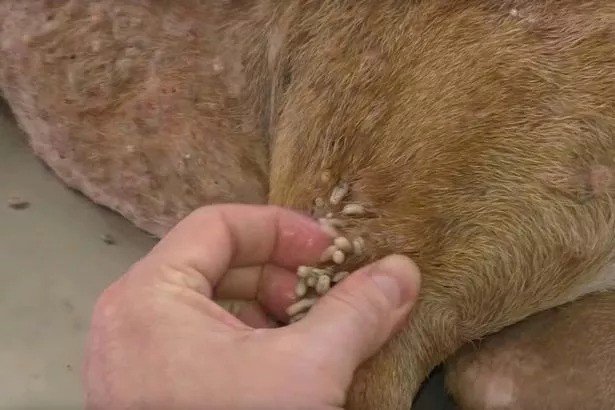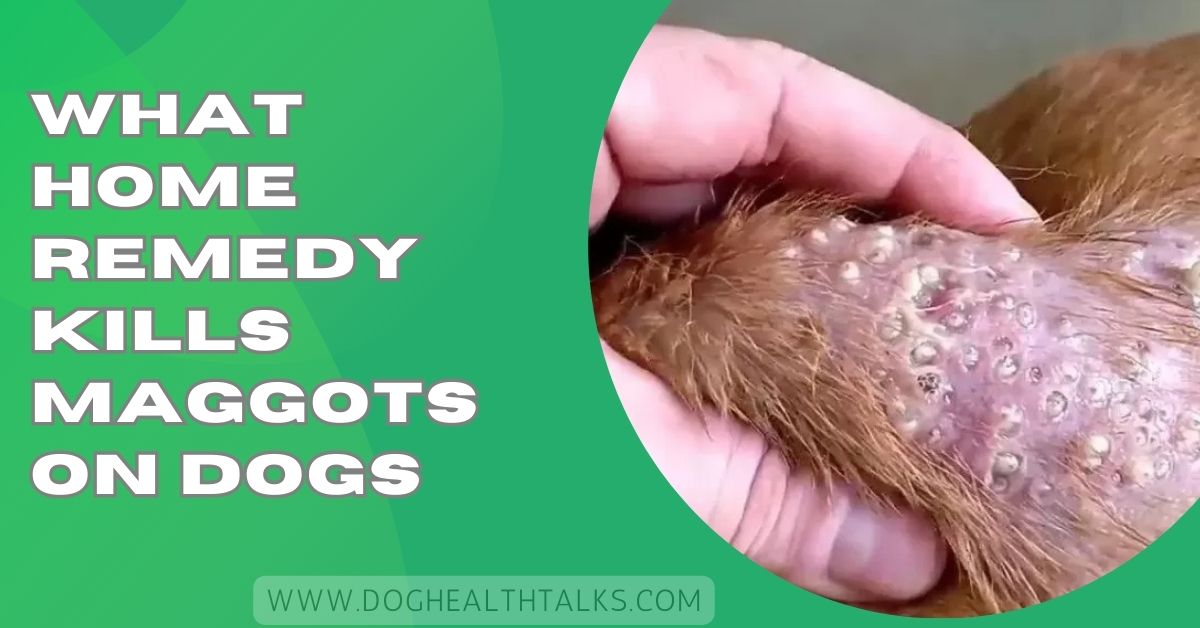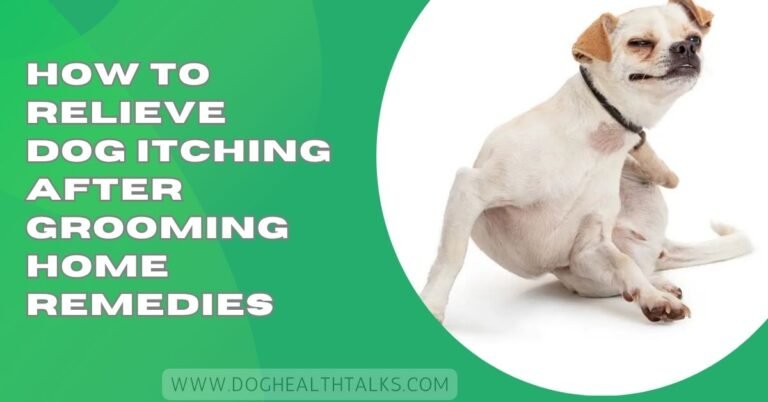What Home Remedy Kills Maggots On Dogs – Don’t Miss Guide!
If you’ve ever discovered maggots on your dog, you know how alarming it feels. These tiny white worms can quickly turn a small wound into a serious health problem. While veterinary care is always the best option, many pet owners want to know: Is there a safe home remedy that can kill or remove maggots on dogs?
The short answer is yes, some simple home remedies can help manage maggot infestations, as a first step. But it’s equally important to remember that myiasis—the medical term for maggot infestation—can spread fast and lead to infections, so a vet visit should always follow.
In this guide, we’ll walk through what maggots are, how they affect dogs, what home remedies work, what you should never use, and how to prevent them in the future.
What Are Maggots on Dogs (Myiasis)?
Maggots are the larval stage of flies. When flies find an open wound, damp fur, or an area with dirt and discharge, they lay eggs. Within hours, these eggs hatch into maggots, which begin feeding on dead or decaying tissue.
On one hand, maggots eat away infected or rotting tissue. But the problem is, they don’t stop there—they can also damage healthy skin, release toxins, and open the door for bacterial infections. This is why untreated maggots can become life-threatening for dogs.
Myiasis is more common in hot, humid climates where flies breed quickly. Dogs with long coats, untreated wounds, or limited grooming are at higher risk.
Signs Your Dog Has Maggots

Sometimes the signs are obvious—you may see tiny, wriggling worms in your dog’s fur or wounds. Other times, the symptoms are less clear. Watch out for:
- Visible white worms on the skin or inside wounds
- Foul odor coming from the infected area
- Redness, swelling, or discharge
- Continuous licking or biting at one spot
- Restlessness, pain, or whimpering
- In severe cases: fever, loss of appetite, or lethargy
Spotting maggots early is crucial. The longer they remain, the deeper they burrow, making removal harder and the damage worse.
Safe Home Remedies to Kill or Remove Maggots
If you catch the infestation early, you can manage it at home before rushing to the vet. Here are the safest remedies most experts and pet owners agree on:
1. Warm Water Rinse
The first step is to rinse the affected area with warm water gently. This helps loosen dirt and flush out some of the maggots on the surface. Use a mild stream—not too hot and not too harsh—so your dog doesn’t feel additional pain.
You can repeat the rinse a couple of times to wash away as many larvae as possible before moving to the next step.
Also Read: What Home Remedy Can I Give My Dog For Gas: Proven Tips
2. Manual Removal with Tweezers
Once the area is rinsed, you’ll likely see maggots clinging to the wound. Wearing disposable gloves, carefully use tweezers to remove each maggot. Please place them in a container filled with hot water or salt water to kill them immediately.
This process takes patience, but it’s very effective. The important part is to be thorough, as even a few maggots left behind can restart the infestation.
3. Petroleum Jelly or Coconut Oil
One common home remedy is to apply a thick layer of petroleum jelly, coconut oil, or even neem oil directly to the wound. Maggots need oxygen to survive, and these oily substances smother them, forcing them to crawl out.
This method not only helps expel hidden maggots but also soothes the wound. Coconut oil has mild antibacterial properties, making it a natural choice.
4. Pet-Safe Antiseptic Cleaning
After removing maggots, clean the wound with a pet-safe antiseptic solution. Diluted betadine, chlorhexidine, or saline solution are commonly used. These reduce the risk of bacterial infection and help the wound heal.
Avoid harsh chemicals like hydrogen peroxide in high concentrations, as they can damage healthy tissue and slow recovery.
5. What NOT to Use (Unsafe Remedies)
Some online suggestions can do more harm than good. Never use kerosene, gasoline, bleach, or strong insecticides on your dog’s skin. These substances may kill maggots, but they will also severely burn or poison your dog.
Salt, vinegar, or lime are also sometimes mentioned. While these can kill maggots, they cause intense pain and tissue irritation, so they’re not recommended as a direct wound treatment.
When Home Remedies Are Not Enough
Home remedies can help with small, surface-level infestations. But if you notice any of the following, it’s time to head to the vet immediately:
- Large numbers of maggots are crawling deep inside the wound
- Open wounds that are bleeding or severely swollen
- Maggots near sensitive areas like eyes, ears, or genitals
- Your dog shows signs of fever, weakness, or refuses food
Delaying professional care in these cases can allow infections to spread and cause serious complications.
Veterinary Treatment for Maggots
At the clinic, your veterinarian will first sedate or calm your dog to make the process painless. They will then thoroughly clean the wound, remove all maggots (even those deep inside), and flush the area with antiseptic.
Depending on the severity, your vet may prescribe:
- Antibiotics to prevent infection
- Pain relievers to keep your dog comfortable
- Antiparasitic drugs that target leftover larvae
- Wound dressings to protect the healing skin
In severe cases, hospitalization may be necessary to manage infection and dehydration.
Prevention Tips to Avoid Maggot Infestation
The best remedy is prevention. Once your dog has suffered from maggots, you’ll want to make sure it never happens again. Here’s how:
- Keep your dog clean: Regular grooming and bathing prevent dirt build-up that attracts flies.
- Treat wounds immediately: Even small cuts should be cleaned and covered. Flies target unattended wounds.
- Control flies in the environment: Keep your dog’s bedding clean and change it often. Use fly screens or repellents around your home.
- Check your dog daily: Long-haired or outdoor dogs should be checked for hidden injuries or damp areas in the fur.
- Maintain hygiene: Dispose of waste properly, as flies breed quickly in dirty surroundings.
What Home Remedy Kills Maggots On Dogs Skin
Rinse the wound with warm water, gently remove any maggots with tweezers, and then apply petroleum jelly or coconut oil.
These smother maggots and help them crawl out. Always clean the area with a mild antiseptic and see a vet.
What Home Remedy Kills Maggots On Dogs Ears
Maggots in the ears are dangerous. Do not pour harsh liquids inside. Gently clean with warm saline and remove visible maggots carefully.
Apply a small amount of coconut oil around the outer ear only. Always take your dog to a vet as soon as possible.
How Fast Can Maggots Kill A Dog At Home
Maggots can start damaging healthy tissue within one day. If many are present, the infection spreads fast and can become life-threatening in less than a week. Quick cleaning, removal, and urgent vet treatment are essential to keep your dog safe.
How Fast Can Dettol Kill Maggots In Dogs
Dettol can kill maggots, but it burns healthy skin and is toxic for dogs. It should never be used on wounds. Instead, use safe methods like warm rinsing, manual removal, and pet-safe antiseptics, then get immediate veterinary help.
What Kills Maggots On A Dog
Warm rinses, manual removal with tweezers, and smothering with petroleum jelly or coconut oil are safe first-aid options.
These methods force maggots out and reduce their number. However, complete removal and proper wound care must be done by a vet.
Must Read: Can Cytopoint Cause Seizures In Dogs – A Complete Guide!
Ivermectin For Maggots In Dogs
Vets sometimes use ivermectin injections or topical treatments to kill remaining maggots inside wounds.
It is not safe to give at home without veterinary guidance, as incorrect dosage can poison dogs. Always let your vet decide if ivermectin is needed.
Symptoms Of Maggots In Dogs
Dogs with maggots may have foul-smelling wounds, visible white worms, redness, swelling, and constant licking at the infected spot.
In severe cases, they become weak, stop eating, and may develop a fever. Spotting these signs early helps prevent serious health risks.
Antibiotics For Maggots In Dogs
After removing maggots, vets often prescribe antibiotics to stop infections and help wounds heal faster.
Common options include amoxicillin or cephalexin, depending on the case. Never give antibiotics without a prescription, as dosage and choice depend on your dog’s health.
FAQs
1. Does Dawn dish soap kill maggots?
Yes, Dawn dish soap can suffocate and kill maggots, but it’s not safe for treating wounds on dogs.
2. How to cure maggots in dogs with home remedies?
Rinse with warm water, remove maggots gently, apply petroleum jelly or coconut oil, then clean with pet-safe antiseptic.
3. Does hydrogen peroxide kill maggots on dogs?
Hydrogen peroxide may kill maggots, but it also damages healthy skin. It should not be used directly on dogs.
4. What causes maggots in dog skin?
Flies lay eggs in untreated wounds, dirty fur, or moist areas. Eggs hatch into maggots that feed on tissue.
5. Does hydrogen peroxide get rid of maggots?
Yes, hydrogen peroxide can kill maggots, but it burns healthy tissue. Safer home remedies or vet treatment are better.
6. What powder kills maggots in dogs?
Veterinarians may prescribe insecticidal or antiseptic powders. Home-use powders are unsafe. Always consult a vet before using any powder.
7. How can I prevent maggots on my dog?
Keep wounds clean, groom regularly, control flies, and maintain good hygiene. Quick wound care prevents maggot infestations.
8. What kills maggots asap?
Warm rinses, manual removal, and petroleum jelly suffocate maggots fast. Veterinary treatment is the safest way to kill all.
9. Will baking soda kill maggots?
Yes, baking soda can kill maggots, but it irritates. It should not be used on dog wounds.
10. Can vinegar kill maggots?
Yes, vinegar can kill maggots, but it stings badly and harms skin. It’s unsafe for dogs with wounds.
Conclusion
Discovering maggots on your dog can be distressing, but quick action makes all the difference. Warm water rinses, careful manual removal, and safe remedies like petroleum jelly or coconut oil can help at home in mild cases.
Still, it’s vital to understand that home remedies are only a first aid step. A veterinarian must examine your dog to ensure all maggots are gone, the wound is treated, and no infection spreads.
Prevention—through good hygiene, regular grooming, and proper wound care—is the best way to protect your furry friend from ever facing maggots again.






